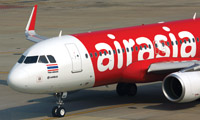Special Report: Security
AirAsia takes vetting into its own hands
AirAsia is pilot airline for new INTERPOL passport vetting system.
June 1st 2014
Malaysian budget carrier AirAsia is the pilot airline for INTERPOL’s I-Checkit system, which screens the passports of its prospective passengers against INTERPOL’s Stolen and Lost Travel Documents (SLTD) database. Read More » The data base of the international police body contains more than 40 million records from 167 countries.
The misuse of travel documents has received heightened attention in recent weeks after two passengers aboard ill-fated Malaysia Airlines flight MH 370 were found to be travelling on illegal passports. Until the travel documents of the two men, Iranians identified as illegal immigrants bound for Europe, were identified as stolen, Malaysian border control authorities did not cross-check passengers’ passports with INTERPOL records.
 |
Only ten countries worldwide systematically screen passengers’ passports against the SLTD, with about four out of every ten passports of international travelers unscreened.
At an industry conference three weeks after MH 370 disappeared, the director general and CEO of IATA, Tony Tyler said: “the industry goes to great effort and expense to ensure that governments who require Advanced Passenger Information (API) receive reliable data. And, along with our passengers, airlines have a right to ask these governments to review their processes for vetting and using this data such as the INTERPOL stolen and lost passport data base.
AirAsia Group chairman, Tony Fernandes, has taken the issue into his own hands. He said the airline is extremely pleased to be the first airline globally to collaborate with INTERPOL in implementing I-Checkit.
“The partnership we have created will result in improved passenger security and will support our desire to offer low fares, but with the added assurance this system and partnership provides,” he said.
The I-Checkit system will be implemented across all of AirAsia’s international operations, which covers 100 airports and 600 international flights a day to 20 countries.
If a positive match is registered via I-Checkit, alerts for additional verification of the travel document are relayed to INTERPOL’s National Central Bureau (NCB) in the country that owns the travel document data and to INTERPOL’s General Secretariat headquarters in Lyon, France.
| 'AirAsia has established the new standard for airline security by screening the passports of all international passengers against INTERPOL’s database' |
| Ronald K. Noble INTERPOL Secretary General |
INTERPOL Secretary General, Ronald K. Noble, said the pilot project will “raise the bar” for passenger safety and security as it will help prevent individuals holding stolen or lost passports from boarding international flights.
“AirAsia has established the new standard for airline security by screening the passports of all international passengers against INTERPOL’s database. After today, airlines will no longer have to depend solely on countries screening passports to keep passengers safe from terrorists and other criminals who use stolen passports to board flights. Like AirAsia, they will be able to do it themselves as well,” Noble said.
The pilot project will allow AirAsia to query the SLTD database, but the airline will not have direct access to it. The pilot project respects national legislation linked to data protection. If a passenger’s passport registers a positive match against the database, AirAsia has procedures that refer the document holder to local authorities. INTERPOL will simultaneously notify all relevant INTERPOL National Central Bureaus worldwide of a positive passport match.